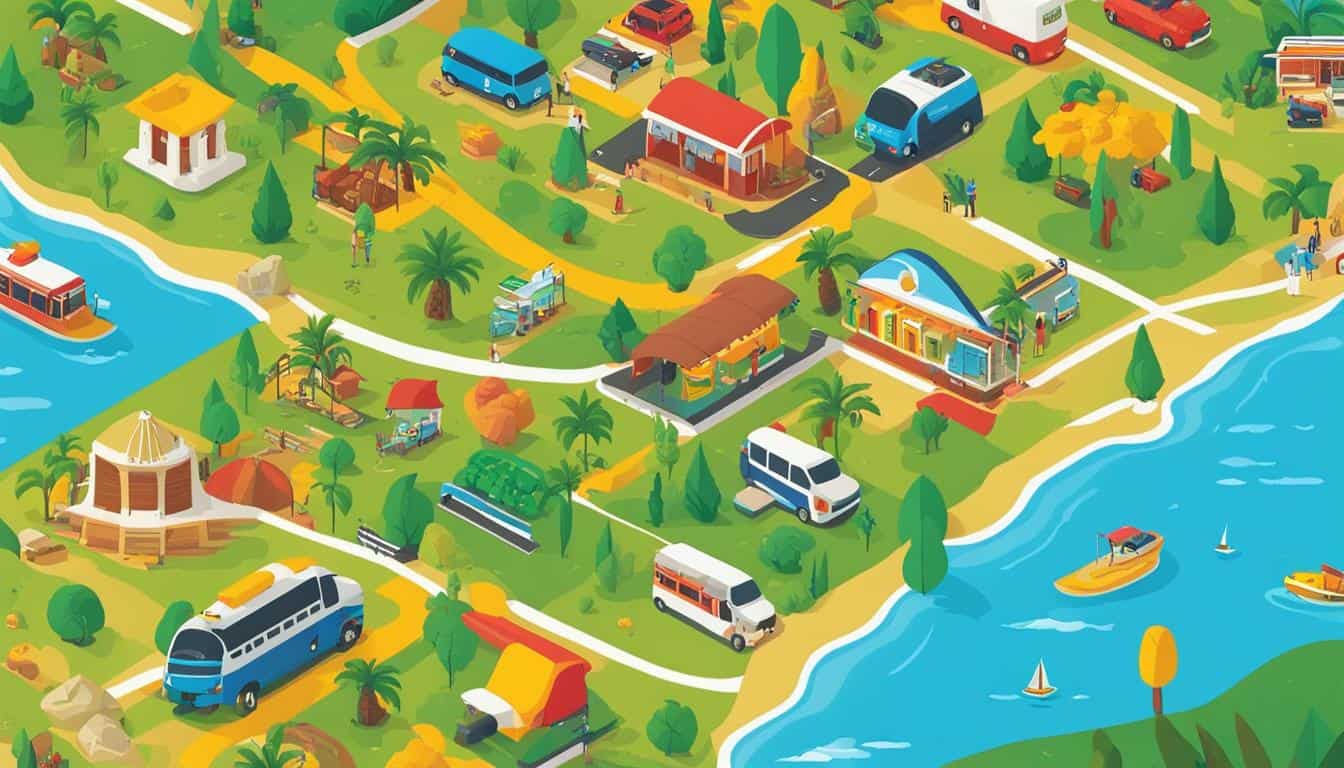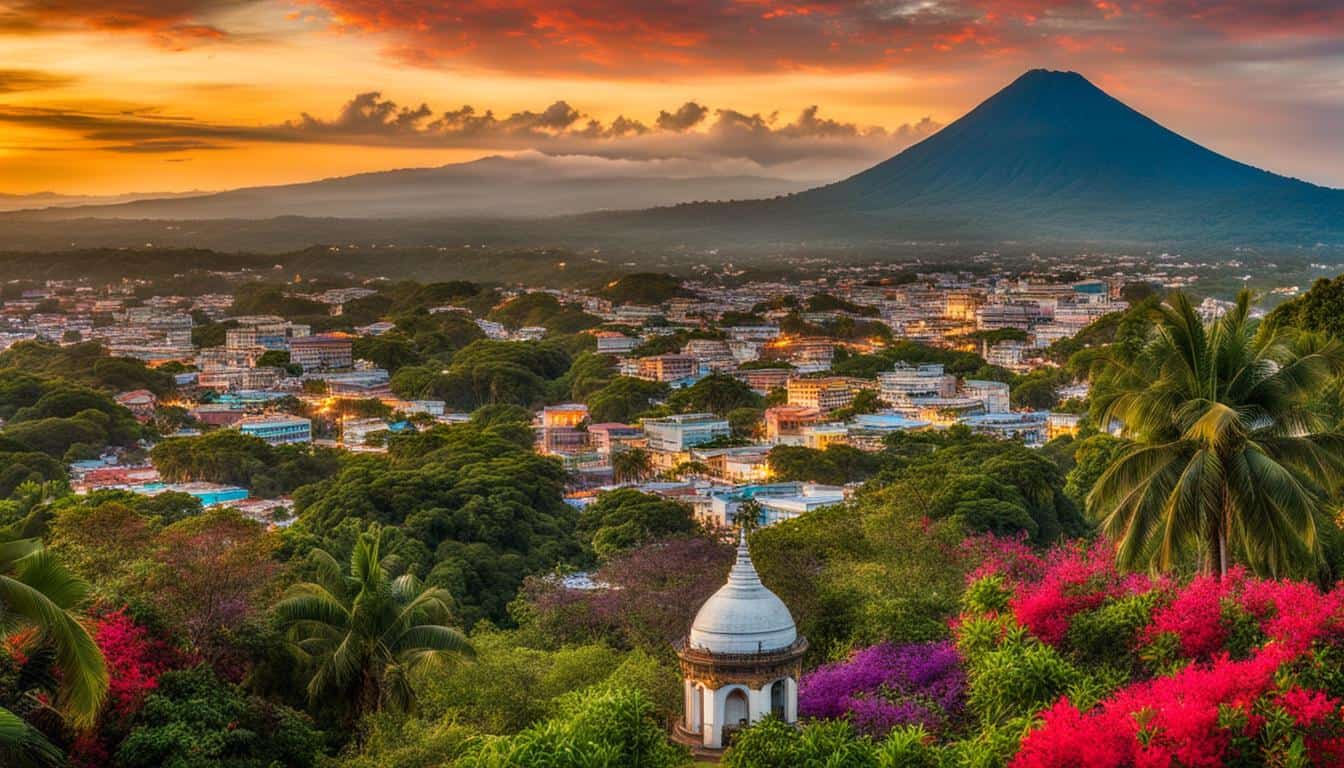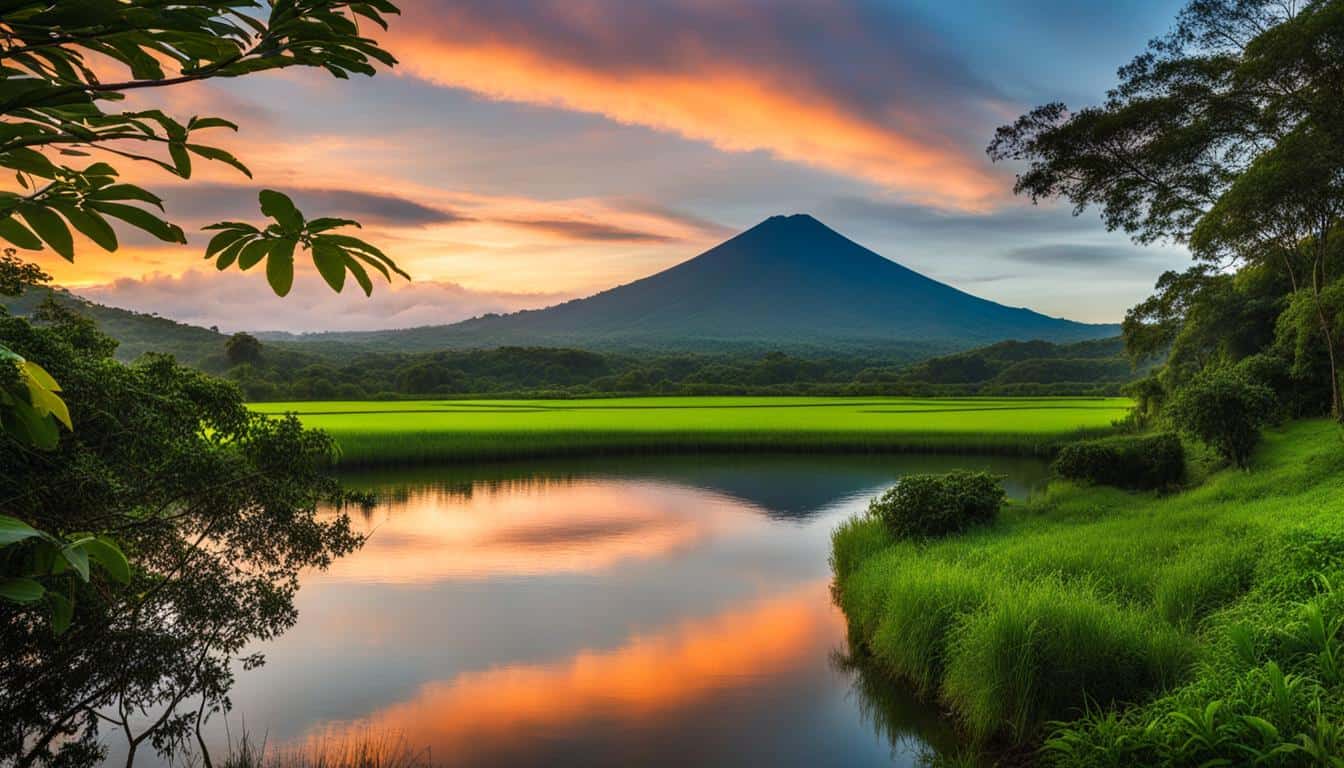El Salvador, a small but mighty country in Central America, offers a wealth of attractions for travelers. From its stunning coastline and volcanoes to its Mayan ruins and vibrant cultural heritage, there is plenty to see and do. Despite its turbulent past, El Salvador has made significant strides in tourism and is now a safe and accessible destination. In this travel guide, we will provide you with all the information and tips you need to plan your trip to El Salvador and make the most of your adventure.
Key Takeaways:
- Explore the diverse range of experiences El Salvador has to offer, from vibrant cities to relaxing beaches and natural wonders.
- Visit during the dry season, from November to April, for the best weather and outdoor activities.
- Know the currency is the US dollar and consider hiring a driver or tour operator for transportation.
- Check entry requirements and be aware of safety precautions, especially in certain areas of San Salvador.
- Learn a few basic Spanish phrases and respect local customs and etiquette.
Planning your Trip to El Salvador
When planning your trip to El Salvador, you have a wide range of experiences to consider. Whether you’re interested in exploring ancient ruins, relaxing on beautiful beaches, or immersing yourself in vibrant cultural cities, El Salvador has something for everyone.
Start your trip in the capital city of San Salvador, where you can visit iconic landmarks such as the National Palace and the Art Museum of El Salvador. Immerse yourself in the rich history and culture of the city by exploring its charming neighborhoods and trying local cuisine.
For nature lovers and adventure enthusiasts, El Salvador offers a plethora of outdoor activities. Hike up the Santa Ana volcano, one of the country’s most famous volcanoes, to enjoy panoramic views of the surrounding landscapes. Explore the Montecristo Cloud Forest and marvel at its diverse flora and fauna. Or head to the Pacific coast and indulge in world-class surfing in the picturesque town of La Libertad.
| Highlights | Recommended Duration |
|---|---|
| San Salvador | 2-3 days |
| Santa Ana volcano | 1 day |
| Montecristo Cloud Forest | 1-2 days |
| La Libertad | 2-3 days |
Don’t forget to explore the lesser-known gems of El Salvador, such as the colonial town of Suchitoto, with its picturesque cobblestone streets and vibrant arts scene. Visit the Joya de Cerén Archaeological Site, often referred to as the “Pompeii of the Americas,” and witness the remarkably preserved ancient Mayan village.
So, whether you’re seeking adventure, relaxation, or cultural immersion, El Salvador has it all. Plan your trip wisely, consider your interests and preferences, and get ready to embark on a memorable journey through this Central American gem.
Best Time to Visit El Salvador
When planning your trip to El Salvador, it’s important to consider the best time to visit in order to make the most of your travel experience. The weather in El Salvador can vary throughout the year, so choosing the right season is key. The best time to visit El Salvador is during the dry season, which runs from November to April. During this time, you can expect clear skies and optimal conditions for outdoor activities such as hiking, exploring the natural landscapes, and enjoying the beaches along the Pacific coast.
It’s important to note that El Salvador experiences a peak in domestic travel during certain periods. The winter holidays, Holy Week (Easter), and the first week of August are popular times for both locals and tourists to travel within the country. If you plan to visit El Salvador during these times, be prepared for higher prices and larger crowds at popular attractions. It’s advisable to plan and book your accommodations and activities in advance to ensure availability.
On the other hand, if you don’t mind the occasional rainfall, visiting El Salvador during the rainy season (May to October) can have its advantages. The countryside is lush and green, and you may be able to take advantage of off-season rates for accommodations and activities. However, it’s important to pack a rain jacket and quick-drying layers as heavy rains can cause road closures and longer travel times.
In summary, the best time to visit El Salvador is during the dry season from November to April, when you can enjoy clear skies and ideal conditions for outdoor adventures. However, if you’re flexible and want to take advantage of off-season rates, the rainy season from May to October can also offer unique experiences. Consider your preferences and plan accordingly to make the most of your trip to this beautiful Central American destination.
| Season | Weather | Advantages | Disadvantages |
|---|---|---|---|
| Dry Season (November – April) | Clear skies, optimal conditions for outdoor activities | Peak season, higher prices, larger crowds | Off-season rates, lush green countryside |
| Rainy Season (May – October) | Occasional rainfall, lush green landscapes | Off-season rates, fewer crowds | Heavy rains, road closures, longer travel times |
Currency and Transportation in El Salvador
When traveling to El Salvador, it’s important to familiarize yourself with the currency and transportation options in the country. Being prepared in these areas will not only make your trip smoother but also help you make the most of your time exploring this Central American gem.
Currency
The official currency of El Salvador is the US dollar, which means there is no need to exchange money if you are a US citizen. This makes transactions and budgeting much simpler, as you won’t have to worry about exchange rates. However, it’s a good idea to carry smaller bills, as larger denominations can be challenging to break, especially in smaller establishments.
ATMs and Credit Cards
ATMs are widely available in El Salvador, particularly in commercial areas and major cities. Most ATMs allow you to select English as the language for your transaction, making it easy to withdraw cash. Credit cards are also accepted in many places, especially in hotels, restaurants, and larger businesses. However, it’s always a good idea to carry some cash for smaller establishments or in case of any technical issues with card payments.
Transportation
When it comes to getting around in El Salvador, hiring a driver or using a tour operator is recommended, especially if you plan to travel between cities. The roads in rural areas may be unpaved and challenging to navigate, and the traffic in the capital city of San Salvador can be heavy at times. Having a local driver who is familiar with the routes and traffic conditions can make your journey safer and more enjoyable.
Additionally, if you prefer not to drive, taxis and public buses are available in most areas. Taxis in El Salvador do not have meters, so it’s important to agree on a fare with the driver before getting in. Public buses are an affordable option for short distances within cities or nearby towns, but they can be crowded and may not always run on a strict schedule.
| Transportation Method | Pros | Cons |
|---|---|---|
| Hiring a driver/tour operator | – Convenience and safety – Local knowledge and guidance |
– Higher cost – Less flexibility in schedule |
| Taxis | – Convenient and readily available – No need to navigate |
– Fare negotiation required – Potential language barrier |
| Public buses | – Affordable – Accessible in most areas |
– Crowded – Limited schedule and routes |
Overall, El Salvador offers various options for currency exchange and transportation, ensuring that you can easily navigate the country and enjoy your travel experience. Whether you choose to hire a driver, take a taxi, or use public buses, being prepared and informed will help you make the most of your time exploring this beautiful destination.

Entry Requirements and Safety in El Salvador
When planning your trip to El Salvador, it is essential to familiarize yourself with the entry requirements and safety precautions to ensure a smooth and secure journey. Here are some tips to help you navigate the necessary steps and stay safe during your visit.
Entry Requirements:
If you are a US citizen, you will need a valid US passport to enter El Salvador. Upon arrival at the airport, you can purchase a tourist card for USD$12, which grants you a 90-day stay in the country. Travelers from other countries should check with their respective embassies for specific visa requirements and entry procedures. It is always recommended to have a copy of your passport and other important travel documents in case of loss or theft.
Safety Precautions:
El Salvador has made significant progress in improving safety for tourists. However, it is essential to stay vigilant and follow these safety precautions:
- Avoid traveling to areas known for gang violence, such as Soyapango, Apopoa, and Mejicanos.
- Avoid walking alone at night, especially in unfamiliar or poorly lit areas.
- Use caution when driving, as road conditions can vary, particularly in rural areas.
- Be aware of your surroundings and keep an eye on your belongings at all times.
- Follow the guidance of local authorities and adhere to any travel advisories or warnings issued by your embassy.
Health Considerations:
Before traveling to El Salvador, it is advisable to consult with a healthcare professional or travel clinic to determine if any specific vaccinations are required or recommended. The only mandatory vaccine is the yellow fever vaccine for travelers arriving from high-risk countries.
To stay healthy during your trip, remember to:
- Avoid drinking tap water and consume only bottled water.
- Ensure that any fruits and vegetables you consume are thoroughly washed or peeled.
- Use insect repellent to protect against mosquito-borne diseases such as dengue and Zika.
- Protect yourself from the sun by wearing sunscreen and appropriate clothing.
- Carry a basic first aid kit with essential medications and supplies.
By familiarizing yourself with the entry requirements and taking necessary safety precautions, you can enjoy a memorable and secure trip to El Salvador. Remember to stay informed, respect the local culture, and embrace the beauty and hospitality of this captivating Central American destination.
Language and Etiquette in El Salvador
When visiting El Salvador, it’s important to be mindful of the local language and etiquette to ensure a respectful and enjoyable experience. The official language of El Salvador is Spanish, so it can be beneficial to learn a few basic greetings and phrases. While English is spoken in some tourist areas, making an effort to communicate in Spanish is appreciated by the locals.
Here are a few key phrases to help you navigate your way in El Salvador:
- Hola – Hello
- Buenos días – Good morning
- Buenas tardes – Good afternoon
- Buenas noches – Goodnight
When visiting Catholic churches, it’s important to dress modestly and respectfully. This means ensuring that your shoulders and legs are covered. Additionally, it’s customary to remove your hat when entering a church as a sign of respect. Remember to be mindful of your surroundings and follow any instructions or guidelines provided by the church.
Tipping is customary in restaurants and bars in El Salvador. While a service charge may already be included in the bill, it’s common to leave an additional 10% as a tip for good service. Always check your bill to see if a service charge has been added before deciding on the tip amount.
By embracing the local language and practicing respectful etiquette, you can enhance your experience in El Salvador and create meaningful connections with the people you meet along the way.
Health and Safety in El Salvador
When it comes to ensuring your health and safety during your trip to El Salvador, there are a few important considerations to keep in mind. Firstly, it is recommended to check if any specific vaccines are required for entry into the country. While no vaccines are mandatory for US citizens, it’s always a good idea to consult with a healthcare professional or visit a travel clinic prior to your departure to discuss any necessary precautions.
Next, it’s important to be mindful of the local water and ensure that you only consume bottled water or use ice made from purified water. Avoid drinking tap water or consuming food from street vendors to reduce the risk of waterborne illnesses.
In case of emergencies, the national emergency number in El Salvador is 911. Additionally, there is a specialized police branch called Politur, dedicated to the safety and well-being of tourists. They can provide assistance and support if needed.
When it comes to personal safety, it is advisable to take common-sense precautions. Avoid displaying excessive wealth or valuable items, be aware of your surroundings, and avoid walking alone at night, especially in areas with less visibility. It is also recommended to use caution when driving, particularly in rural areas where road conditions may be challenging.
By staying informed, taking necessary precautions, and using common sense, you can ensure a safe and enjoyable trip to El Salvador.
Must-See Attractions in El Salvador
El Salvador is a hidden gem in Central America, offering a wide range of must-see attractions for all types of travelers. Whether you’re seeking natural beauty, cultural heritage, or thrilling adventures, this small country has it all. Here are some top recommendations for places to visit in El Salvador:
1. Montecristo Cloud Forest
 Step back in time at the Cihuatán Ruins, an impressive archaeological site that showcases the ancient Mayan civilization. Explore the ruins, learn about the history and culture of the Mayans, and marvel at the remarkable architectural structures that still stand today.
Step back in time at the Cihuatán Ruins, an impressive archaeological site that showcases the ancient Mayan civilization. Explore the ruins, learn about the history and culture of the Mayans, and marvel at the remarkable architectural structures that still stand today.
5. La Libertad
Escape to the picturesque beach town of La Libertad, where you can relax on pristine beaches, indulge in delicious seafood, and enjoy outdoor activities such as swimming, snorkeling, and fishing. La Libertad is also renowned for its vibrant surf scene, attracting surfers from around the world.
These are just a few of the many must-see attractions that await you in El Salvador. Whether you’re an adventure seeker, nature lover, or history enthusiast, this Central American gem has something to offer everyone. Plan your trip to El Salvador and prepare to be captivated by its beauty, rich culture, and warm hospitality.
Conclusion
El Salvador may be a small country, but it offers a wealth of natural beauty, cultural heritage, and adventure. Despite its turbulent past, El Salvador has emerged as an accessible and safe destination for travelers. Whether you’re exploring stunning beaches, hiking volcanoes, or delving into the country’s rich history, El Salvador provides a unique travel experience.
With warm hospitality and a vibrant culture, El Salvador invites you to venture off the beaten path and discover its hidden gems. From the bustling capital city of San Salvador to the tranquil coastal towns, you’ll find a diverse range of experiences to suit every traveler’s taste.
So pack your bags and get ready for an unforgettable journey through this Central American gem. El Salvador awaits, ready to captivate you with its natural wonders and enchanting charm. Start planning your adventure today and create memories that will last a lifetime.
FAQ
What are some must-see attractions in El Salvador?
Some of the highlights include the Montecristo Cloud Forest, El Tunco beach, Puerta del Diablo, Cihuatán Ruins, and La Libertad.
When is the best time to visit El Salvador?
The best time to visit El Salvador is during the dry season, which runs from November to April.
What currency is used in El Salvador?
The official currency of El Salvador is the US dollar.
Is it safe to travel to El Salvador?
While El Salvador has made significant strides in improving safety, it’s important to be aware of certain areas in and around San Salvador that should be avoided due to gang violence. Overall, with proper precautions, El Salvador can be a safe destination for travelers.
What language is spoken in El Salvador?
The official language of El Salvador is Spanish.
What are some health and safety tips for traveling in El Salvador?
It’s recommended to verify if any specific vaccines are required for entry and to avoid tap water. In case of emergencies, the national emergency number is 911, and there is a specialized police branch dedicated to the well-being of tourists.
